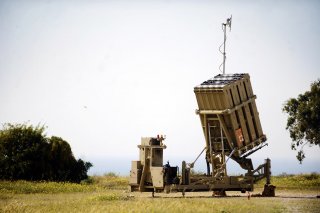Russia Mocks America for Buying Israel's Iron Dome
Moscow is not impressed.
The U.S. may buy Israel's Iron Dome missile defense system.
And Russia is laughing.
"Israel Markets 'Essentially Failing' Iron Dome Missile Defense System to US Army," read the headline in Sputnik News.
The story begins in September, when the United States tested Iron Dome as part of its search for a new short- and medium-range air defense system, or SHORAD, to stop aircraft and drones as well as artillery shells and rockets. Though it has been tested in combat, and its manufacturer Rafael has partnered with U.S. defense contractor Raytheon, Iron Dome doesn't have a lock on the SHORAD contract: it is competing against three other air defense systems, including modified Bradley and Stryker armored vehicles. Yet that didn't stop Israeli media from speculating about an Iron Dome purchase by the United States, which has already contributed $900 million in funding for the development of the system.
News of a possible American purchase also gave Russia an opportunity to fire a salvo, though whether the United States, Israel or Iron Dome was the target isn't clear. The Sputnik article—which only criticized Iron Dome and not any other missile defense system—heavily cited the work of Ted Postol, the former Massachusetts Institute of Technology professor and vigorous skeptic of the effectiveness of U.S. and Israeli missile defense. Postol drew attention when he estimated the Iron Dome intercept rate in the 2012 Gaza conflict against Hamas was at only 5 percent, rather than the 90 percent claimed by Israel.
Postol also examined data on insurance claims filed by Israelis, on the assumption that a successful missile defense would result in fewer claims. In the words of Sputnik: "He [Postol] moreover foresaw 'significant insurance claims' arising in areas successfully defended by Iron Dome, as a successful intercept can at rare best destroy explosive warheads carried by artillery rockets, not pieces of debris from the artillery rocket itself, which will fall whether or not an artillery rocket has been intercepted. The Israelis, he noted, had not provided 'any evidence of a reduction in ground damage' that would necessarily accompany the 'amazing success rates' claimed for Iron Dome."
In other words, the Israelis lied. Sputnik did include a link to a critique which found Postol's research to be sloppy. But the clear thrust of the article was that Iron Dome is of dubious effectiveness, and that the United States would be stupid to buy it.
Contacted by The National Interest, Postol is also skeptical about whether the same weapon can be used to shoot down both drones and rockets. "Shooting down a drone is an entirely different challenge relative to destroying the warhead on an artillery rocket. Anyone claiming that a success against a drone, helicopter or low-flying aircraft is equivalent to demonstrating capabilities against artillery rockets has absolutely no idea about what they are talking about."
"Iron Dome uses very light relatively inexpensive interceptors that could potentially be useful in short-range air defense applications," Postol added. "Perhaps the U.S. Army believes such a capability would fill such a hole in U.S. air-defense needs. However, since the U.S. owns the air, there may be no real military need for such a system to defend U.S. troops on the ground."
In any event, why would Russian media criticize a possible sale of Israeli missile defense technology to America? One reason could be that Russia doesn't want America to get its hands on Iron Dome. Or, it could simply be an opportunity to disparage the competition—Russia and Israel are both major weapons exporters—and sow a little trouble in the U.S.-Israel alliance at a time when Israel and Russia forces could potentially engage in combat over Syria.
Or, Russia could just be taking a shot at Iron Dome because it can. "I would caution against attributing too much logic and strategy here," says Olga Oliker, director of the Russia and Eurasia Program at the Center for Strategic and International Studies in Washington, D.C. "My guess is Sputnik picked up the story about the possible purchase, and looked for downsides. I don’t see how a Sputnik story would affect U.S. choices, or U.S. or Israeli policy."
Michael Peck is a contributing writer for the National Interest. He can be found on Twitter and Facebook.
Image: Wikimedia Commons / Israel Defense Forces
Recommended:
Why North Korea's Air Force is Total Junk

